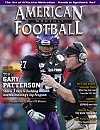Article CategoriesAFM Magazine
|
AFM’s 2010 College Coaches of the Year© More from this issueFCS In September, the Eagles, whom the media had given modest preseason aspirations in the Big Sky Conference, were routed in Bozeman, losing at Montana State, 30-7 to fall to 2-2. But then a funny thing happened. Head coach Beau Baldwin saw a spark ignite the following week in a win at Weber State. “I remember the way we responded after the Weber State game, and I honestly felt that this group has a little something about them, but le....The full article can only be seen by subscribers.
|
|
|||||||
| HOME |
MAGAZINE |
SUBSCRIBE | ONLINE COLUMNISTS | COACHING VIDEOS |
Copyright 2026, AmericanFootballMonthly.com
All Rights Reserved





